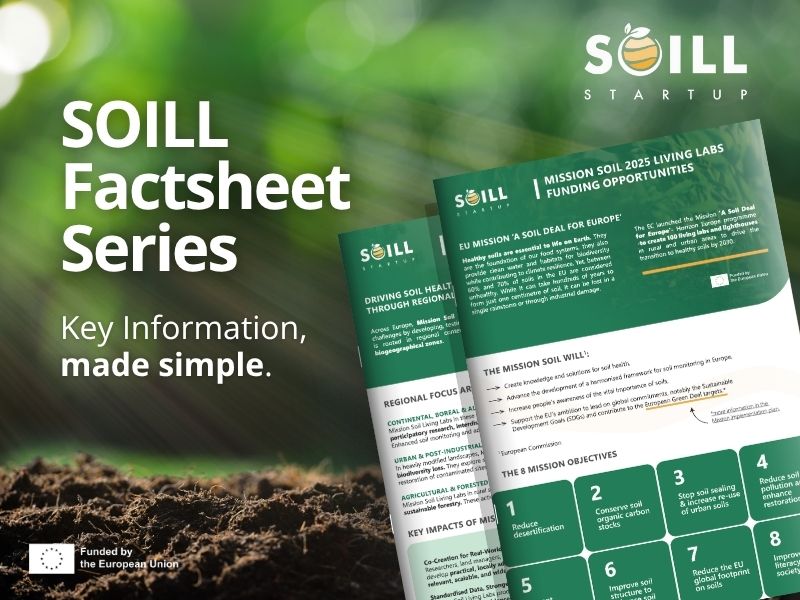A new collection of Factsheets is now available on the SOILL Start-Up website to support participants in designing their project proposals. The factsheets serve as practical guides to help in aligning the proposals as closely as possible with the mission’s goals.
By exploring each factsheet individually, it is possible to gain a clear understanding of the focus and objectives of each theme, the specific challenges and issues being addressed, the criteria to be met in project proposals, and the essential information required for effective participation in the Living Labs.
These practical resources cover 6 key topics such as:
-
Urban land use: to prevent hazards such as the presence of toxic and harmful elements, reduce pollution, and improve the structure and biodiversity of urban soils. The objective is to incentivise transformations that promote restoration through infill, reclamation, regeneration, remediation, reuse, and upcycling projects. Pélatforms will be created where different areas of expertise can meet and collaborate to support policy decisions and interventions, for example by identifying and monitoring the presence of toxic elements.
-
Natural and semi-natural land use: the main challenges include increasing pollution from air and water, which disrupts soil functions such as nutrient mineralisation and leads to habitat degradation. The establishment of invasive plant species, favoured by soil degradation and changing climatic conditions, further threatens these areas. Moreover, there is a widespread lack of awareness about the value of natural soils as low-renewable resources that provide important ecosystem services in largely unmanaged areas. Efforts will be made to promote public participation in managing green infrastructure around and between villages and cities, and to raise awareness on the strategic importance of soils as reservoirs of biodiversity, beyond their aesthetic value.
-
Industrial land use: Former and current industrial areas face challenges such as historical waste deposits, former mining areas, and contaminated sites, all of which can pose risks to surrounding populations, ecosystems, and agricultural production. It is necessary to implement a transition to healthy soils through sustainable, risk-based land management, which can restore soil, water, and air quality while supporting the delivery of ecosystem services.
-
Forestry land use: maintaining the ecosystem services provided by forest soils is essential for sustainable management. Challenges arise both from natural processes and from human practices influenced by socio-economic conditions. Increasing soil carbon storage, reducing erosion and compaction, maintaining fertility, and avoiding desertification are among the key priorities. Living Labs created within Mission Soil will address these issues by fostering collaboration and co-design, supporting real-life experiments in the field, initiating targeted research in both controlled and natural environments, encouraging knowledge sharing among stakeholders, and identifying feasible actions to preserve and enhance soil health.
-
Agricultural land use: Crops present challenges that vary according to climate, soil type, management practices, and socio-economic factors, and are closely linked to key mission objectives such as reducing desertification, conserving soil organic carbon stocks, and stopping soil sealing. The response will involve fostering collaboration on the co-design of solutions through experiments on research stations and lighthouse farms, initiating targeted scientific work in laboratories and field settings, promoting faster uptake of solutions and strengthening partnerships between farmers, industry, and investors.
-
Biogeographical regions: challenges differ significantly, whether in continental, boreal and alpine regions or other landscapes. The approach seeks to generate two main impacts. First, co-creation for real-world impact, in which researchers, land managers, policymakers, farmers, and citizens collaborate in Living Labs to develop practical, locally adapted soil solutions that are relevant, scalable, and widely accepted. Second, accelerating the transition to a sustainable bioeconomy, by merging environmental, economic, and social innovation in a way that supports healthy soils, climate resilience, and the provision of ecosystem services.
-
Soil-related ecosystem services: there is a need to improve awareness of these services and present them in a way that is understandable to decision-makers, land users, and planners, as well as distributing costs and benefits fairly. Integrating these considerations into land and soil management, spatial planning, and policymaking, while capturing intangible synergies and trade-offs, will be essential for balanced and effective interventions.
The full collection of Factsheetsis available at this link.
